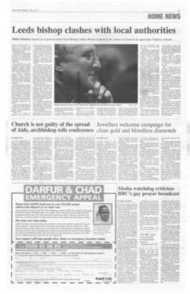Page 4, 4th May 2007
Page 4

Report an error
Noticed an error on this page?If you've noticed an error in this article please click here to report it.
Tags
Share
Related articles
Western Aid Finally Reaches Suffering Christians Of Sudan
Pope Sends Envoy To Sudan Amid Mounting Crisis
Sudanese 'play Games' With Peace Proposals
Sudan Bishops Tell Of Killings
The Sudanese Church Fears A New War
Khartoum accused of Islamising the south
BY JOHN PONTIFEX
A CHURCH leader in Sudan has said that the Khartoum government is using the Darfur crisis as a smokescreen for the spread of Islam to the Christian south through bribery.
Bishop Daniel Adwok Kur said that while the world's focus was on Darfur, the regime of Sudan President Omar at Bashir would use all means possible short of violence to Islamise the mainly Christian and Animist south of the country'.
The Auxiliary Bishop of Khartoum's comments, which came in an interview with the charity Aid to the Church in Need, made it clear that the Khartoum Government remains as committed to spreading Islam to the south as it was during the height of the north-south civil war (19832005).
After a conflict which left more than 25 million dead, the peace deal Bashir reached with the south Sudanese rebels, the Sudanese People's Liberation Army/Movement (SPLA/M), seemed to show that the Khartoum government had renounced its vision of a united Islamic state of Sudan.
But Bishop Adwok said that Khartoum's objectives remained unchanged since the Comprehensive Peace Agreement of January 2005.
What had changed, he said, were the regime's methods; instead of violence and warfare, the emphasis now was on fmancial incentives.
Muslim missionary organisations based in the MiddleEast were, he said, pumping "very large amounts" of money into south Sudan with the express purpose of converting people to Islam of a radical kind.
"When money talks, the truth is silent," Bishop Adwok said. "[The government] wants a free hand. What they want is the consolidation of the Islamic culture."
Lucrative alliances forged with Gulf states, especially Saudi Arabia, were paving the way for massive Islamic development in the south, with vast numbers of mosques and a stream of schools and hospitals coming in their wake.
Bishop Adwok said: "The people responsible for these constructions know that there will not be enough Muslims to run the schools, hospitals and other centres they want to build. They will have to turn to the local people the Christians."
He added: "They will be encouraged to convert to Islam to secure their jobs in these new institutions." He said similar concerns about the threat of bribery had affected the politicians, too, even though southern Sudan was now governed by the SPLA/M former rebels.
"The governors in the south will not be appointed by Khartoum but if they can be persuaded to lie low and even given bribes, then we have a real problem."
Bishop Adwok said past practice had shown that bribery and coercion were favourite tactics of expan sionist militant Muslims in Sudan.
He said some of the largest mosques in cities in south Sudan, such as Juba, were almost certainly built with the help of cash incentives for local governors.
The bishop said: "With huge support coming from the Gulf countries, there are plans to build mosques all over the south. Some are very big."
Bishop Adwok gave the interview during a visit to Britain where he was the keynote speaker at Aid to the Church in Need's Glasgow Event on Friday last week.
In his talk, given after Mass at St Andrew's Cathedral, Bishop Adwok praised ACN's benefactors for their long-standing support for the Church in Sudan.
Special mention was made of the charity's Scottish supporters' support for Save the Saveable, a schools and feeding programme for more than 30,000 children living in displacement camps outside Khartoum.
blog comments powered by Disqus

















